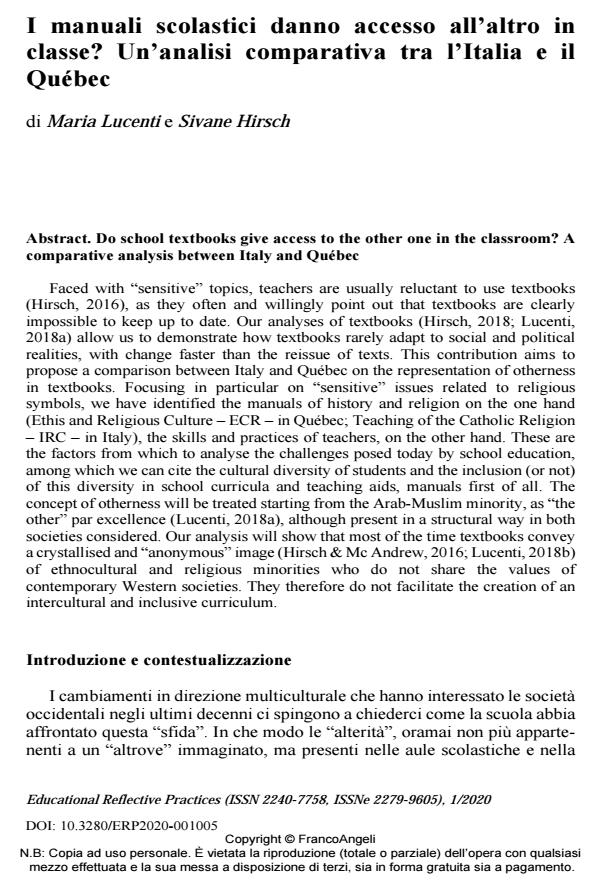Do school textbooks give access to the other one in the classroom? A comparative analysis between Italy and Québec
Journal title EDUCATIONAL REFLECTIVE PRACTICES
Author/s Maria Lucenti, Sivane Hirsch
Publishing Year 2020 Issue 2020/1
Language Italian Pages 25 P. 92-116 File size 296 KB
DOI 10.3280/ERP2020-001005
DOI is like a bar code for intellectual property: to have more infomation
click here
Below, you can see the article first page
If you want to buy this article in PDF format, you can do it, following the instructions to buy download credits

FrancoAngeli is member of Publishers International Linking Association, Inc (PILA), a not-for-profit association which run the CrossRef service enabling links to and from online scholarly content.
Faced with "sensitive" topics, teachers are usually reluctant to use textbooks (Hirsch, 2016), as they often and willingly point out that textbooks are clearly impossible to keep up to date. Our analyses of textbooks (Hirsch, 2018; Lucenti, 2018a) allow us to demonstrate how textbooks rarely adapt to social and political realities, with change faster than the reissue of texts. This contribution aims to propose a comparison between Italy and Québec on the representation of otherness in textbooks. Focusing in particular on "sensitive" issues related to religious symbols, we have identified the manuals of history and religion on the one hand (Ethis and Religious Culture - ECR - in Québec; Teaching of the Catholic Religion - IRC - in Italy), the skills and practices of teachers, on the other hand. These are the factors from which to analyse the challenges posed today by school education, among which we can cite the cultural diversity of students and the inclusion (or not) of this diversity in school curricula and teaching aids, manuals first of all. The concept of otherness will be treated starting from the Arab-Muslim minority, as -the other- par excellence (Lucenti, 2018a), although present in a structural way in both societies considered. Our analysis will show that most of the time textbooks convey a crystallised and "anonymous" image (Hirsch & Mc Andrew, 2016; Lucenti, 2018b) of ethnocultural and religious minorities who do not share the values of contemporary Western societies. They therefore do not facilitate the creation of an intercultural and inclusive curriculum.
Maria Lucenti, Sivane Hirsch, I manuali scolastici danno accesso all’altro in classe? Un’analisi comparativa tra l’Italia e il Québec in "EDUCATIONAL REFLECTIVE PRACTICES" 1/2020, pp 92-116, DOI: 10.3280/ERP2020-001005